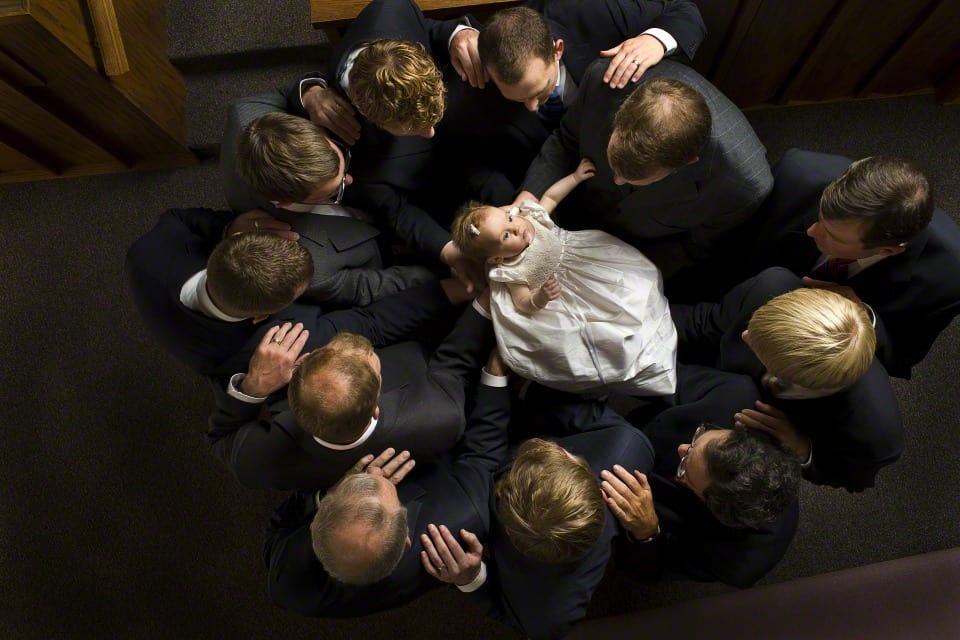For members of The Church of Jesus Christ of Latter-day Saints, the first rite for a newborn is a baby blessing. If you have Latter-day Saint friends with a new baby, you might be invited. If you are, you might have questions and want to know more about Latter-day Saint baby blessings before you accept.
Latter-day Saint baby blessings, in short, is an ordinance which has two purposes: 1) to give the baby a name and 2) call down blessings for the baby’s spiritual and physical welfare in a blessing given by Heavenly Father. While any member of the Church can receive priesthood blessings, typically the step of giving a name is only performed for infants.

The ordinance almost always is performed at the beginning of a sacrament meeting. For a couple of my children, however, we did it at home so that our family members who lived out of state could be there.
What happens in Latter-day Saint Baby Blessings?
First, let me point out that every ward (congregation) may do baby blessings a little different. So, I will describe what I have typically observed and how I have blessed my own children. Make sure to leave some room for a little variation in your expectations.
Because this is not what Latter-day Saints consider a “saving ordinance” there is more leeway or wiggle room with how it is performed and what is said.
When the baby blessing is announced, the person talking at the pulpit will invite whoever has been invited to participate to come forward.
Usually, the father (or whoever is performing the ordinance) will invite a few other members of the Church from the ward or the family to help. These men should hold the Melchizedek Priesthood. In the case where the dad is not a Melchizedek Priesthood holder, it is common for the family to get another family member who does hold that priesthood to perform the ordinance.
If you have been invited to attend, but not to specifically help in the ordinance, then probably don’t go forward.
Whoever is performing the ordinance brings the baby to the front of the chapel and then the others will form a circle around the baby. They will each place a hand under the baby and gently bounce him in a soothing manner to keep the baby calm.
The blessing actually has two parts.
The first part is addressed to our Father in Heaven and the baby is given a name. The instructions for this part of the blessing are as follows in the Church’s Gospel Library:
- Addresses Heavenly Father
- States that the blessing is performed by the authority of the Melchizedek Priesthood.
- Gives the child a name.
Often men will say something like: “the name by which he shall be known in the world and on the records of the Church is….”
While this is the common phrasing, this particular wording is not required in the guidelines from the Church. So, it is not a big deal if the wording is varied.

The second part of the blessing is the blessing part. I have always felt a little awkward with the transition to the second part because we start by addressing Heavenly Father like I do in most prayers. Then, after I have given the name, I start to address my baby and provide the blessing.
Why do Latter-day Saints Bless Their Babies?
Latter-day Saint baby blessings like I have described are an important “first step” into the Church. These blessings are in accordance to the direction Jesus Christ gave to Joseph Smith when Joseph established the Church in New York back in 1830.
D&C 20:70 gives the following instruction:
Every member of the church of Christ having children is to bring them unto the elders before the church, who are to lay their hands upon them in the name of Jesus Christ, and bless them in his name.
There are strong connections between these baby blessings and the actions of the Savior when he was on the Earth. When his disciples tried to turn away children, Jesus chastised them and said, “Suffer the little children to come unto me, and forbid them not: for of such is the kingdom of God.Verily I say unto you, Whosoever shall not receive the kingdom of God as a little child, he shall not enter therein. And he took them up in his arms, put his hands upon them, and blessed them” (Mark 10:14-16).
Jesus Christ also blessed the children when he visited the Nephites in the Americas. “He took their little children, one by one, and blessed them, and prayed unto the Father for them” (3 Nephi 17:21).
What are the Saving Ordinances?
The Church of Jesus Christ of Latter-day Saints teaches that there are ordinances that are necessary for exaltation. These ordinances are baptism, confirmation, ordination to the Melchizedek Priesthood (for men), the temple endowment, and the marriage sealing.
Because these ordinances are essential for exaltation, these are the ordinances that Latter-day Saints perform as proxy for the dead in the temple.
According to The Book of Mormon, little children have no need for these “saving ordinances” because they are covered by the Atoning sacrifice of Jesus Christ. “And their little children need no repentance, neither baptism. Behold, baptism is unto repentance to the fulfilling the commandments unto the remission of sins. But little children are alive in Christ, even from the foundation of the world” (Moroni 8:11-12).
Baby blessings, on the other hand, are not necessary for salvation or exaltation. They are basically meant to assist in the individual’s life in mortality. Blessings, like these or other priesthood blessings for the sick or Patriarchal Blessings, are a way to invite the Savior’s power and direction into our lives.
Names are Significant in Religious Settings
As part of the baby blessing the child gives the baby a name. To be honest, I have wondered why we do this. After all, the baby already has a name on record with the state. Why give the baby the name twice.
I am glad that I spent the time thinking about this because it led to an interesting connection to the Old Testament. There are numerous instances where the giving of a name takes an important part of our religious background. One of the first instances is in the Garden of Eden when the Lord begins to give things names including rivers, people, and animals. Genesis 3:20 records, “And Adam called his wife’s name Eve; because she was the mother of all living.”
The Matthew Henry Commentary on the Whole Bible says the following about this instance:
God having named the man, and called him Adam, which signifies red earth, Adam, in further token of dominion, named the woman, and called her Eve, that is, life. Adam bears the name of the dying body, Eve that of the living soul. The reason of the name is here given (some think, by Moses the historian, others, by Adam himself): Because she was (that is, was to be) the mother of all living. He had before called her Ishah—woman, as a wife; here he calls her Evah—life, as a mother. Now, 1. If this was done by divine direction, it was an instance of God’s favour, and, like the new naming of Abraham and Sarah, it was a seal of the covenant, an assurance to them that, notwithstanding their sin and his displeasure against them for it, he had not reversed that blessing wherewith he had blessed them: Be fruitful and multiply. It was likewise a confirmation of the promise now made, that the seed of the woman, of this woman, should break the serpent’s head. 2. If Adam did it of himself, it was an instance of his faith in the word of God. Doubtless it was not done, as some have suspected, in contempt or defiance of the curse, but rather in a humble confidence and dependence upon the blessing. (1.) The blessing of a reprieve, admiring the patience of God, that he should spare such sinners to be the parents of all living, and that he did not immediately shut up those fountains of the human life and nature, because they could send forth no other than polluted, poisoned, streams. (2.) The blessing of a Redeemer, and promised seed, to whom Adam had an eye, in calling his wife Eve—life; for he should be the life of all the living, and in him all the families of the earth should be blessed, in hope of which he thus triumphs.
Later in the Bible there are other powerful examples of Jehovah making an important emphasis on names. The God of the Old Testament changed the name of Abram to Abraham; Sarai to Sarah; Jacob to Israel; and lots of others (see this link for a comprehensive list of all name changes in the Bible)
Often these name changes were associated with a covenant and a commitment to follow the God of Israel. This represented an important point when it came to the faith of the individual. Abraham, for example, had his name changed in connection with the promise from God that he would be the father of nations. His name became a reminder of the divine promise.

In the Book of Mormon, there is another important emphasis on the role of names in our personal discipleship. Helaman, a Nephite prophet, named his two sons after the fathers of the Nephite nations: Nephi and Lehi.
He told them, “Behold, I have given unto you the names of our first parents who came out of the land of Jerusalem; and this I have done that when you remember your names ye may remember them; and when ye remember them ye may remember their works; and when ye remember their works ye may know how that it is said, and also written, that they were good” (Helaman 5:6).
Giving our children a name in a worship setting like a sacrament meeting has some of these religious, symbolic connections to the importance of the names in our personal journeys back to the Father.
Conclusion
In conclusion, I would say that Latter-day Saint baby blessings are non-essential blessings that are meant to symbolically start off a child’s journey back to God.

I was blessing my baby today and a little confused to why until I read this article. Thank you for writing it. It was helpful for me to I understand why I was doing what I had been thought to do. It gave me a greater understanding and appreciation for baby blessings.
Beautiful that we can do such a powerful thing for our small ones right at the start of life. Immediately I thought of John the Baptist and the significance of his name and the event they referenced in the Bible where his name was to be given. Thank you for the read.